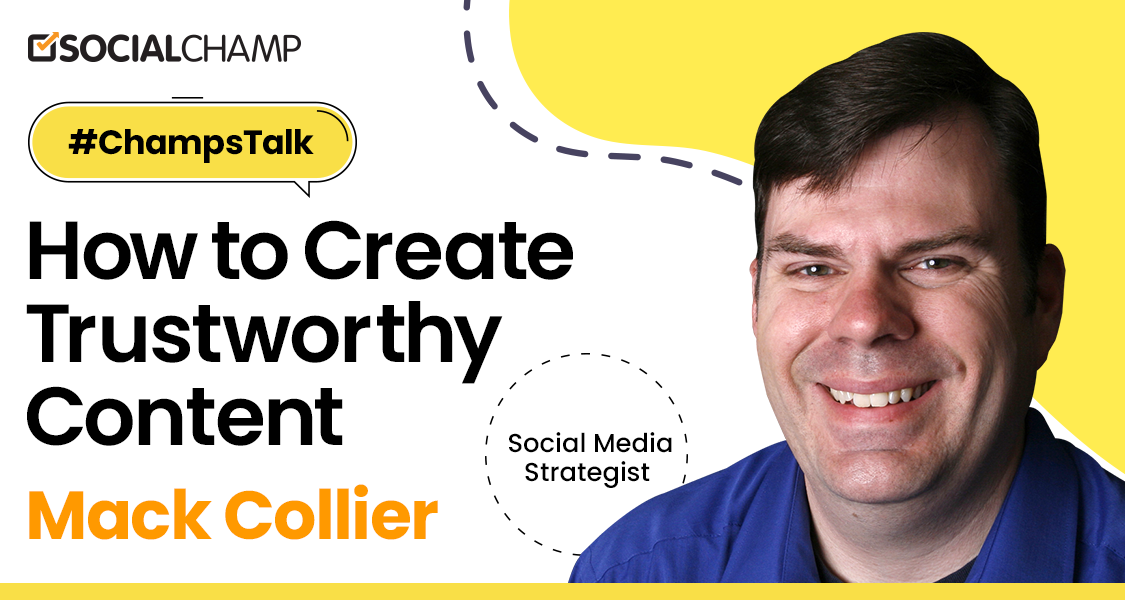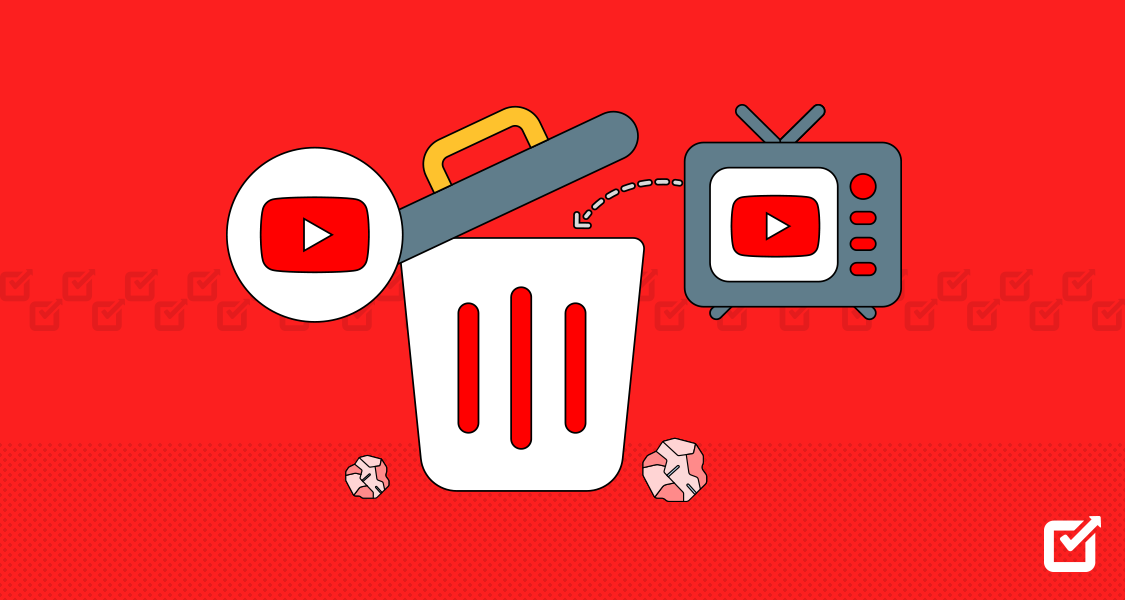Content is the best way to connect with your target audience to build trust. You can use social media to create informative or entertaining content in blogs, videos, images, or infographics.
It’s essential to be careful with your content because it can give your clients an opinion of your company before they’ve even had a chance to interact with it. Alternatively, it can provide them with enough information to make a purchasing decision if it’s an informational piece.
This is why building trust with your audience is crucial and requires extra attention to ensure that every piece is trustworthy.
We invited an expert, Mack Collier, on #ChampsTalk to share his thoughts and tips to create trustworthy content. Mack is a digital marketing strategist who helps companies connect with their clients to drive business growth. Let’s see what he has to say!
We are Live! 📢on #ChampsTalk – Chat Session with @MackCollier | Social Media Strategist
Topic of discussion: How to Create Trustworthy Content
Join us for an exciting session! 🤩#ChatSession #SocialChamp pic.twitter.com/xTWj6X2Bhg
— Social Champ (@SocialChampSays) November 17, 2021
Thank you @MackCollier for joining us today 🙏
Let's begin with our first question: What makes you more likely to trust content from a brand or individual? #ChampsTalk pic.twitter.com/FrM1OYoGuX
— Social Champ (@SocialChampSays) November 17, 2021
A1 – Thanks for having me! I am more likely to trust content that is RELEVANT to me. If your content is relevant to me, that tells me you took the time to try to understand who I am, and how to reach me. #ChampsTalk https://t.co/b56ho29gYQ
— Mack Collier (@MackCollier) November 17, 2021
A1 Content that is relevant to your audience is required to gain their attention, and you can't win anyone's trust until you have their attention #champstalk
— Mack Collier (@MackCollier) November 17, 2021
Q2. Trust is hard to build, so how do you ‘prove’ a claim you’ve made in your content? #ChampsTalk pic.twitter.com/atO9qUmv66
— Social Champ (@SocialChampSays) November 17, 2021
A2 It's great to reference outside sources that can back up your claims. Such as testimonials from customers, or industry experts. But above all, never make a claim you can't prove, that's one of the fastest ways to lose trust! #ChampsTalk https://t.co/m8HrLk08EV
— Mack Collier (@MackCollier) November 17, 2021
A2 And let's say you do make a claim that's incorrect. If you catch your mistake, then OWN IT. Just be honest, say you goofed up, here's the correct information, and apologize. THAT is a great way to build trust. #ChampsTalk
— Mack Collier (@MackCollier) November 17, 2021
This is a great example of creating content that builds trust. Instead of trying to sell its services, @semrush encourages the person to instead learn about SEO first. This tells the person that they care more about what's best for them than just getting a quick sale #champstalk https://t.co/NeUdus4UsL
— Mack Collier (@MackCollier) November 17, 2021
Q3. How can a brand lose your trust with its content?#ChampsTalk pic.twitter.com/9prM6dMaOq
— Social Champ (@SocialChampSays) November 17, 2021
A3 The quickest way I lose trust in a brand is when the brand creates content that shows me that it doesn't appreciate me. This can be by creating content that has no value to me, or by creating content that isn't relevant to me, or by ignoring me or lying to me. #champstalk https://t.co/urlWM0qWPw
— Mack Collier (@MackCollier) November 17, 2021
Q4. Rigid data and information will make your content more reliable but how can one avoid overloading content with information?#ChampsTalk pic.twitter.com/vKbT3yV7NL
— Social Champ (@SocialChampSays) November 17, 2021
A4 In general, you only need one or two pieces of research or data to backup your claims of why a concept you are discussing is worth the audiences time and attention. If you do a deeper dive into the concept and its intricacies, then you may need more stats #champstalk
— Mack Collier (@MackCollier) November 17, 2021
Q5. Should brands talk openly about themselves? Does more transparency make you more likely to trust them? #ChampsTalk pic.twitter.com/hptKAmqnX1
— Social Champ (@SocialChampSays) November 17, 2021
A5 In general, yes, brands should talk openly about themselves, but in ways that create relevance for the customer. Such as showing us the people that work for the brand, what the brand's values are, how they act on them, etc #champstalk
— Mack Collier (@MackCollier) November 17, 2021
A5 Years ago, @Scobleizer made a name for himself while he was working at Microsoft, by taking a video camera around to the work stations of employees and just asking them to talk about who they were, and what they did every day #champstalk
— Mack Collier (@MackCollier) November 17, 2021
A5 This was brilliant, because it showed us the REAL PEOPLE behind the Microsoft brand. Sometimes their Windows PC would freeze while on camera, who cares, that's real life! By being transparent, it built trust #champstalk
— Mack Collier (@MackCollier) November 17, 2021
Q6. Is creating trustworthy content about the reader or about the subject of the content? #ChampsTalk pic.twitter.com/lP0vWjlJ0A
— Social Champ (@SocialChampSays) November 17, 2021
A6 Always focus on your audience first. If you focus on the audience and whats important and relevant to them, then the subject of the content will take care of itself #champstalk
— Mack Collier (@MackCollier) November 17, 2021
Q7. What are some examples of brands or people whose content you trust? #ChampsTalk pic.twitter.com/3rzYrelCuH
— Social Champ (@SocialChampSays) November 17, 2021
A7 So let me give you three different examples of brands and people I trust, and for various reasons #champstalk
— Mack Collier (@MackCollier) November 17, 2021
A7 The second is @crestodina. Andy does a great job of creating 'Here's what I've learned' type content. He shares what he's learned, what worked and what didn't. That makes his content more credible and trustworthy #Champstalk
— Mack Collier (@MackCollier) November 17, 2021
A7 The 3rd example of creating trust w content is Twitch streamer @nickmercs. He is insanely popular and makes millions in sponsorships. But he is very open with his community about where the $ comes from and how it helps him. This makes his fans want to support him #champstalk
— Mack Collier (@MackCollier) November 17, 2021
Q8. Building trustworthiness is a difficult process but maintaining it can be even more strenuous. Share some dos and don’ts when it comes to maintaining trustworthiness. #ChampsTalk pic.twitter.com/NhprGYpFSr
— Social Champ (@SocialChampSays) November 17, 2021
A8 We've been talking a lot about the things you can do to create trustworthiness in content, like be open, tell the truth, be relevant, etc, but there's one underlying truth we haven't discussed yet… #champstalk
— Mack Collier (@MackCollier) November 17, 2021
A8 You have to actually CARE about the people you are trying to connect with. On some level. When you care about people, you are straight with them, you want to create value for them, and they will pick up on that, and trust you for it #champstalk
— Mack Collier (@MackCollier) November 17, 2021
Q9. What's the one thing you can do today to start creating more trustworthy content? #ChampsTalk pic.twitter.com/oWduwP7w1U
— Social Champ (@SocialChampSays) November 17, 2021
A9 Create relevant content for your audience. Put in the work to understand who your audience is, and align what they need help with, with the help you can offer. #champstalk
— Mack Collier (@MackCollier) November 17, 2021
Q10. Does collaborating with influencers help a brand’s trustworthiness and goodwill? #ChampsTalk pic.twitter.com/UIEUVGDkye
— Social Champ (@SocialChampSays) November 17, 2021
A10 It can, as long as the influencers are people that your customers trust and respect. When trying to work with influencers, it's always best to try to pick ones who are familiar with your brand. Happy customers who are also influencers is the perfect match #champstalk
— Mack Collier (@MackCollier) November 17, 2021
Q11. Who would you like to nominate next for our ChampsTalk? #ChampsTalk pic.twitter.com/yHKFaiHEEu
— Social Champ (@SocialChampSays) November 17, 2021
A11 thank you for having me, this has been a blast! I would like to nominate @AlexaCowen_ she is brilliant and is focused on creating customer-centric content and experiences. I encourage everyone to follow her as well! #champstalk
— Mack Collier (@MackCollier) November 17, 2021
That's it for today folks, we would like to thank you @MackCollier for your knowledgeable insights. 🙏 pic.twitter.com/qEyQ2MBt91
— Social Champ (@SocialChampSays) November 17, 2021
How to include other voices to create trust in the content? @MackCollier @SocialChampSays #ChampsTalk
— Marium Fahim Khan (@marium_fahim) November 17, 2021
Hi Marium! Let's say you want to write a blog post about why we should be investing in cryptocurrency. You can write the blog post and make your case, THEN add in quotes from other more trusted and known sources, who back up your claims. #champstalk https://t.co/tiPjO0WTcX
— Mack Collier (@MackCollier) November 17, 2021
So you are making your case for investing in cryptocurrency, then adding quotes from famous/trusted experts, who are saying the same things you are. It makes your content look more credible and trusted AND makes you look more credible as well! #champstalk
— Mack Collier (@MackCollier) November 17, 2021
What is an example of trustworthiness in your content? It would be great if you can share any real-life examples.@MackCollier @SocialChampSays
— Tahniat Alam (@tahniatalam) November 17, 2021
We will talk about this a bit later, but a GREAT way to build trust with your audience is to share your mistakes. Tell us what you tried that didn't work, then tell us how you fixed the problem #champstalk
— Mack Collier (@MackCollier) November 17, 2021
By sharing your mistakes or what went wrong, you are making yourself vulnerable to your audience, but you also become more relatable. "Hey Mack screws up just like I do!" #champstalk
— Mack Collier (@MackCollier) November 17, 2021
We would like to thank Mack for taking out the time for us and educating our audience on creating trustworthy content!






